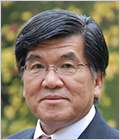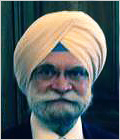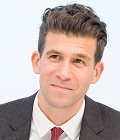Eisai has established an advisory board comprised of external experts in international policy in order to obtain a wide range of advice from a highly qualified perspective on ESG-related discussions and sustainability issues, including access to medicines, that are attracting a great deal of attention from society.
With the aim of further enhancing our initiatives for access to medicines, since 2011, we had convened an Access to Medicines Advisory Board to obtain advice from experts in the field of international policy and development on our strategies and activities to provide solutions sustainably to patients and their families. In 2018, we expanded the scope from "Access to Medicines Advisory Board" to form "Sustainability Advisory Board" to discuss topics related to Eisai’s activities on sustainability and to receive recommendations and advice from our advisors. In addition to further strengthening access to medicines, we also aim to discuss Eisai’s response to global issues highlighted in international community, such as human rights and climate change, as well as economic security and other issues, and to translate advice from the members of Sustainability Advisory Board into enhancing our corporate value.
The current members of Eisai’s Sustainability Advisory Board are :

Mr. Mitsuo SAKABA (Chairman)
Former Ambassador to Vietnam/Belgium. Mr. Mitsuo Sakaba graduated from Yokohama City University and started his career at the Ministry of Foreign Affairs of Japan in 1973. As a trainee of the Ministry, he studied at the Montpellier University in France (1974-76). Following that, he served as Director of Technical Cooperation in charge of JICA in the Economic Cooperation Bureau and as the Counsellor of Permanent Delegation of Japan to the OECD in charge of development cooperation issues. He also served as the Consul-General in Chicago, the Director-General of the Latin American and Caribbean Affairs Bureau, and as Ambassador to Vietnam (2008-10) and the Kingdom of Belgium (2012-14). In September 2014, after leaving the Ministry of Foreign Affairs, he became a Professor of International Politics at Yokohama City University (2015-17). Since January 2017, he is serving as a Member of the Public Security Examination Commission under the Ministry of Justice.

Mr. Ujal Singh BHATIA
Former Indian Ambassador and Permanent Representative to the World Trade Organization (WTO). Mr. Bhatia joined the Indian Administrative Service in 1974 and spent the first two decades of his service career in development administration in the state of Odisha, in Eastern India. Between 1995-2000, he worked in the Central Government in Delhi, as Joint Secretary in the Commerce and Industry Ministry. During this period, he dealt with a range of trade policy issues - domestic, bilateral, regional and multilateral. From 2000-2004, he returned to Odisha and held several senior positions there, including Principal Secretary. From 2004-2010, he served as India's Ambassador and Permanent Representative to the WTO. He was a Member of the Appellate Body of the WTO between 2011-2020, including as its Chairman for two years.

Dr. BT Slingsby
Founding and Former CEO & Executive Director of GHIT Fund. BT Slingsby founded the Global Health Innovative Technology (GHIT) Fund – the world’s first public-private fund focused on the development of new medicines for low- and middle-income countries. In his role as CEO and Executive Director at the GHIT Fund, he deployed over 100 investments in the discovery and development new anti-infectives, and grew the fund to $350M in capital. Following the GHIT Fund, he founded Catalys Pacific to transform life-sciences innovation in Japan using transpacific bioventure. He specializes in healthcare investments in the pharma sector including novel therapeutics, diagnostics and vaccines. BT has sat on the U.S. National Academies of Medicine Forum for Public Private Partnerships and has authored over 50 peer-reviewed articles on medicine and public health. BT currently teaches as an adjunct faculty at the Graduate School of Medicine at the University of Tokyo and Kyoto University.
Message from Mr. Mitsuo SAKABA (Chairman)
The global landscape is now dramatically changing around the international health environment. Ebola fever in Africa crossed national borders and frightened the whole world in 2014-15, exposing serious shortcomings in crisis management of the global health regime. In Asia, we are not immune either to new challenges of infectious diseases as seen in recent cases of SARS, Avian Influenza (Bird Flu) and MERS, while confronting traditional, but still serious diseases of HIV/AIDS, malaria and tuberculosis. The health issue is high on the agenda for deliberating the United Nations’ new global Sustainable Development Goals and human security. Against this backdrop, the Japanese Government adopted in 2013 a specific Strategy on Global Health Diplomacy in order to strengthen its contribution in the field of Universal Health Coverage (UHC). This lays the foundation for encouraging public-private partnerships.
Also, in recent years, the achievement of SDGs has become a universal issue following the adoption of "the 2030 Agenda for Sustainable Development" in the United Nations (September 2015). In response to this, international investors are increasingly concerned about ESG (environment, society, corporate governance) in corporate management, and it is an important element of investment decisions. The pharmaceutical industry also has to work on that urgently and Eisai is no exception. In particular, voluntary efforts in the social field are not "obligations", but should be considered as "management pillars" related to the future of companies.
On this point, it is worthy of note that Eisai has been playing an exemplary role in combatting neglected tropical diseases (NTDs) in developing countries. Eisai is providing medicines to help in WHO’s fight to eliminate Lymphatic Filariasis, one of the larger scale NTDs. In January 2012, Eisai signed the historic London Declaration which is the largest global public-private partnership aiming at eliminating ten NTDs by 2020 as the only signatory among Japanese pharmaceutical companies. Particular attention should also be paid to the fact that in 2013, Eisai contributed to the launch of the GHIT Fund (Global Health Innovative Technology Fund), the first ever public-private partnership in Japan aiming to eliminate infectious diseases in developing countries. All these contributions by Eisai in the field of “access to medicines (ATM)” are well reflected in the high ranking (no.8) of the company in the ATM Index 2018, published by the highly respected ATM Foundation based in the Netherlands.
It is my great pleasure to be a member of Eisai’s ESG team as the chairman of the Sustainability Advisory Board since I spent a large part of my diplomatic career in the field of development cooperation. I am convinced that Eisai, with its World Health Initiative to develop treatments for infectious diseases, will make a further contribution to relieve the international community from the heavy yokes of infectious diseases and will further advance the corporate goal of ESG improvement.
Message from Mr. Ujal Singh BHATIA
The compulsions of a high cost research driven business model often lead firms to focus primarily on bottom lines. What makes Eisai different is its focus on the hhc (human health care) concept which puts patients and their families at the centre of its business philosophy. Additionally, Eisai seeks to enhance corporate value by focusing on non-financial capital based on the theme of ESG (Environment, Social, Governance). Together, these concerns lead Eisai into several inter-connected directions – a deep respect for the environment, protection of human rights, solid corporate governance structure along its value chain, devising country specific marketing and pricing strategies to ensure that those who need can obtain access to Eisai’s medicines, as well as a multi pronged research programme to develop new products for Neglected Tropical Diseases as well as for diseases like Dementia. These initiatives collectively define Eisai’s approach to sustainability and are well synchronized with the United Nations Sustainability Development Goals (SDGs).
Eisai's commitment to Access to Medicines (ATM) is reflected in its continuing search for new business models, public–private partnerships and product development partnerships. The 2010 agreement with the WHO to establish a public-private partnership to combat lymphatic filariasis is an illustration of this commitment. Eisai's position in the Global ATM Index demonstrates that the ATM objective is embedded in the core of Eisai's business philosophy.
Eisai's participation in the London Declaration, a unique public-private partnership which aims to eliminate 10 NTDs by 2020, is another affirmation of its sustainability based business philosophy. Eisai's active participation in the Global Health Innovative Technology Fund (GHIT Fund) launched by the government of Japan and companies will enable it to contribute to the discovery and development of global health technologies.
Eisai's unique commitment to a broadly defined sustainable growth philosophy marks it out as a global enterprise with a conscience. I am sure that in the years to come, this commitment can only deepen.
Message from Dr. BT Slingsby
“Let whoever is in charge keep this simple question in her head (not, how can I always do this right thing myself, but) how can I provide for this right thing to be always done?”
Florence Nightingale capsulized the essence of our modern concept for environmental, social and governance (ESG) best –simply: do right for society and its sustainability. This ethic precedes any notion in modern schools of thought on corporate governance and, I believe, it can also be found in Eisai’s human health care (hhc).
Eisai’s corporate philosophy, hhc, denotes its vision to impact patients’ and their families’ lives through innovation and the de novo creation of such. This exceeds pharmaceuticals and expands the gamete of evolving technologies and advancing sciences for health care. It resonates from a fundamental relationship of trust with society and its institutions, citizens and patients.
Such an ethos can be found in how Eisai works in partnership. Perhaps most remarkable are its partnerships in global health. Acknowledging the importance of governance and sustainability in partnership, Eisai established the Advisory Board (former ATM Advisory Board) to work in parallel with its World Health Initiative – a multidisciplinary virtual team traversing departmental lines to innovate for patients neglected by the market. Years later, the company now houses a rich repertoire of programs in global health, all stemmed in partnership.
Today, Eisai pioneers partnership far beyond global health. The company partners to create ecosystems of support for patients with dementia and their families, partners to advance innovation with venture business, partners to build its platform for big data, and will continue to partner as a tenet of hhc.
This foresight and leadership banks on Eisai’s acknowledgment of the indispensable relationship of trust with society. It both encapsulates ESG and stems from a sustainability to impact the lives of patients and their families.
This Advisor Board will discuss, critique and advise on the sustainability of Eisai’s business and partnerships. We have an amazing opportunity at our hands – today is perhaps the most exciting time in history to be engaged in health care. Privileged to be a member of this Board, I look forward to engaging in honest debate with Eisai’s leadership.
